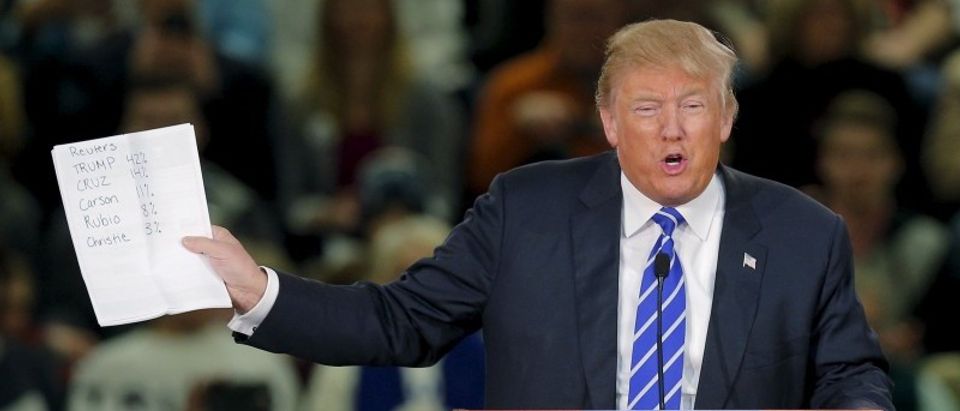South Carolina’s Republican governor Nikki Haley is hell-bent on preventing Donald Trump from winning her state’s presidential primary on February 27. After Trump announced his plan last month to temporarily bar Muslims from entering the United States, Haley went public with her strong opposition to Trump’s candidacy, saying it would be “wrong” for the country. Haley’s not alone. Other Prominent South Carolina conservatives including Sen. Tim Scott and former Sen. Jim DeMint (who currently heads the Heritage Foundation) are all hoping to rally around a more establishment candidate to try to derail Trump’s candidacy.
There’s a good reason the “Stop Trump” movement is congregating in South Carolina. The first two GOP contests occur in small, overwhelmingly white and largely rural states which seem to embody the American ethos but utterly fail to reflect its demographics. South Carolina, by contrast, looks a lot like America as a whole. And its primary precedes a dozen contests in the South – including in blockbuster states like Texas and Georgia — that are held on the same day and that account for nearly 40 percent of the total GOP delegate count.
In a party that increasingly relies on its population base in the South, what happens in the Palmetto State can place a large and indelible stamp on the entire Republican race.
Trump’s dominance of South Carolina is undeniable. Before he entered the race last summer, Jeb Bush and Scott Walker were vying for the lead; now Walker’s out, and so is Sen. Lindsay Graham, the state’s native son, whose candidacy utterly failed to gain traction. And Bush is trailing badly. Rumors that Marco Rubio had built a strong foundation in SC for his “late-start” strategy have also faded. And while Ted Cruz appears to be surging, the latest poll has Trump firmly in the lead, with a 14-point lead overall, according to the Real Clear Politics polling average.
South Carolina is often misread by political observers – and not just by “outsiders.” For one thing, the evangelical vote, though strong, can only carry a candidate so far here. In 2008 “moderate” John McCain – to some, the quintessential RINO – bested evangelical champion Mike Huckabee, even though Huckabee had upstaged McCain in Iowa by appealing to the state’s evangelicals. The former Baptist minister did come close to pulling off a second upset in SC, but in the end a plurality of voters concluded that McCain was the stronger, more “electable” candidate.
There’s another reason that South Carolina can defy predictions: its “open” primary system, one of just 19 nationwide. In New Hampshire, unregistered or independent voters can vote in the state’s GOP primary, and many do, but in South Carolina even registered Democrats can cast ballots. In a year when the vote for the Democratic candidate is already sewn up, lots of non-Republicans could decide to cross over, as they did in 2012.
You might think that favors the most establishment Republican – but does it? In 2012, Newt Gingrich – running as a conservative firebrand — won a stunning upset victory over Mitt Romney. Like Trump, he combined outspoken opposition to party orthodoxy with a commanding personal presence forged primarily through his dominance of the GOP debates. Voters felt they were being steamrolled, and rebelled against the establishment – and Haley – who had publicly backed Romney more than year before the primary.
Right now, the establishment faces the same problem in SC that it confronts in New Hampshire: a handful of candidates – Jeb Bush, Marco Rubio, and Chris Christie — whom, combined together, would likely defeat Trump. However each still wants the nomination for himself. Rep. Trey Gowdy (of Benghazi hearings fame) had promised to hold off on an separate endorsement, but recently changed his mind and endorsed Rubio, even campaigning with the Florida senator in Iowa.
Haley’s endorsement could prove to be a key wild card. She was highly unpopular with South Carolina voters when she endorsed Romney early in 2011 — and probably hurt the Massachusetts governor’s chances. But thanks to her deft handling of the Confederate flag issue she’s since become a political darling and even a rising star — with some suggesting that she’d make an excellent VP. Haley is known to be leaning toward one of her fellow governors – either Bush or possibly Christie – but insists that she will wait until just before the primary – after the results from Iowa and New Hampshire are in – to announce her support.
With expectations for Trump – especially his own – so high, he might survive an expected defeat in IA if he wins NH. But a subsequent defeat in SC, especially if his loss marked a second victory for say, Cruz or Rubio, might well be devastating. Virtually the entire GOP – with the support of the conservative media – would be calling for him to withdraw. But unless Trump concedes, his lock on a key segment of the electorate that rarely votes – and that the party needs to win – could still give him enormous leverage all the way to the convention.
Stop Trump? Only in a manner of speaking perhaps.


